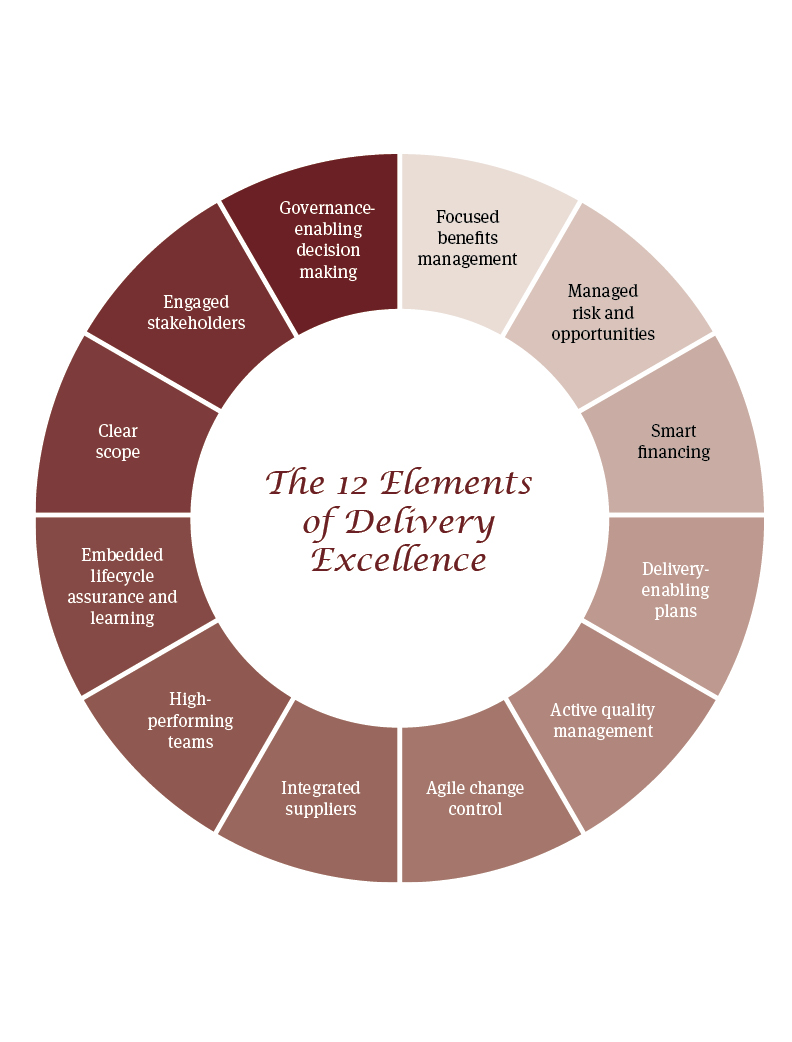The world is changing faster than ever. The race to increase or retain competitive advantage is intensifying. Time to market and the length of competitive advantage is reducing as new technologies and wholesale market disruption create threats and opportunities.
Flexibility and agility are required to respond swiftly in order to reduce the threats and take advantage of the opportunities. Business transformation is becoming a constant state rather than the major transformation projects of old. Businesses are focusing on key areas including new citizen and customer-focused products and services, expansion into new markets, new technologies and efficiency improvements.

A PwC framework of what to focus on for project delivery success consists of
These include digital transformation of business processes utilising technologies such as cloud computing, business analytics, artificial intelligence and the internet of things to maximise the value of data.
Yet, we are still seeing a high volume of change efforts failing to meet stakeholder expectations – in fact up to 70 percent. That is significant when you factor in that these change projects typically impact the wider business, customers and suppliers. With the volume and speed of change, business sponsors often feel removed from the detail and need help to feel closer, increasing their confidence and the certainty of projects achieving the desired outcome.
There are three critical questions that business sponsors should be guided by:
1. Is it achievable?
Is the vision, objective and benefit realistic and clearly understood? Does it align to your strategic goals? Does your organisation have the culture, capability and drive to see it through?
2. Is the time right?
Does your organisation have the capacity to undertake this change or will other commitments get in the way and undermine it?
3. Do you have the necessary skills?
Does your organisation have the necessary project management skills and access to the right resources at the right time?
Framework for success
Business transformations need a framework and active management if they are to succeed through the three main stages of creating the business case, delivering the change, and realising the benefits and outcomes.
What should you look out for?
Project failures are often the result of inexperience leading to poor project management and leadership. Warning signs to act on include:
- A lack of objective criteria and quality fact-based information to support your investment in change.
- A complex, risky project or programme of strategic importance.
- You are receiving mixed messages or are
beginning to question the quality of the status reporting you are receiving. - Concerns about the organisation’s capacity and capability to deliver the change.
- Concerns about an implementation or systems vendor capacity and capability to deliver the change.
- Insufficient information and insight into progress of your transformation projects.
- Projects beginning to run behind schedule, over budget, or there are significant or a high number of scope changes.
- Project issue resolution is slow.
What good looks like:
- Projects that are leadership-led, sponsored by senior executives who are actively focused on outcomes.
- Projects that are business-led, focusing on the content and quality of what’s being delivered with corporate strategy. To avoid ending up as system implementation projects and shifting attention away from your original business objectives transformation, projects should not be technology-led.
- Stay focused on delivering business outcomes. The project’s goals need to be clearly understood across the team and the wider organisation.
- You know your project structure and your team’s skills and experience and most importantly what skills and experience need supplementing or sourcing externally.
- Taking prompt action to ensure that the project is resourced appropriately.
- You have access to the right information enabling you to ask the right questions and make informed, timely decisions over the lifetime of the project.
- You aren’t overly reliant on a third-party (risk losing control of your project). The contractual obligations of any third-party are clearly aligned with your project objectives.
Six project to-dos
Set up for success
You need to make sure upfront that you have the right project governance and leadership in place. This includes effective sponsorship, strong stakeholder management and third party relationships. Clear objectives, scope and benefits make a strong compelling business case.
Right people, in the right place, making informed decisions
Successful projects rely on having experienced, skilled people who know how to deliver them, along with business people who have deep knowledge of the organisational functions and processes.
Good reporting doesn’t guarantee success
Effective and accurate progress reporting is critical, but don’t spend too much time and effort on reporting and progress meetings at the expense of the quality of delivery.
Keep an eye on the bigger picture
Project leadership needs to remain objective and focus on what really matters.
Projects are never easy
Transparency of issues, which allow you to tackle them early and head on. Projects are inherently complex and you should expect to deal with some difficult issues.
Projects don’t exist in a vacuum
Regularly connect with the wider organisation and be prepared to reflect changes driven from outside of the project.
The comments in this article of a general nature and should not be relied on for specific cases. Taxpayers should seek specific advice.




